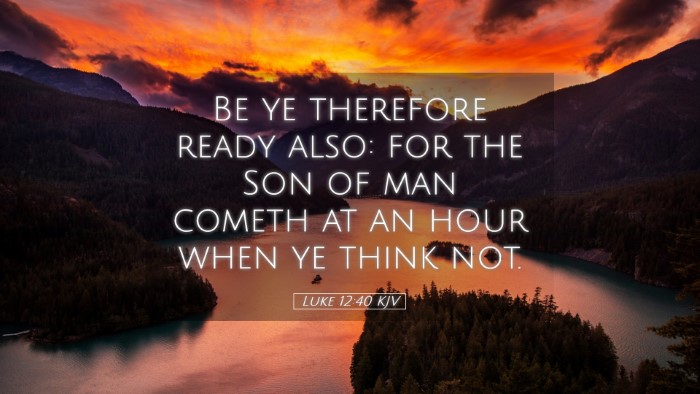Commentary on Luke 12:40
Bible Verse: "Be ye therefore ready also: for the Son of man cometh at an hour when ye think not." (Luke 12:40)
Introduction
This verse is a pivotal reminder in the teachings of Jesus regarding preparedness and expectation of His return. The context surrounding this statement highlights the need for vigilance in the life of believers. Drawing insights from various public domain commentaries, this exploration aims to provide a deep understanding relevant to pastors, students, theologians, and Bible scholars.
Exegesis of the Verse
Luke 12:40 serves as both a warning and an encouragement. The phrase "Be ye therefore ready" calls for an active stance of readiness among believers. Matthew Henry emphasizes that readiness is a moral and spiritual state that involves being vigilant in one’s spiritual conduct. He suggests that this readiness is not merely about being passive, but rather engaging actively in the work of God's kingdom.
Theology of Readiness
Albert Barnes elaborates on the theological implications of being ready, explaining that the readiness spoken of should permeate all aspects of a believer's life. It encapsulates a heart posture that is aligned with God’s will, reflecting a lifestyle characterized by faithfulness, prayer, and good works. This aligns with the teachings found in other parts of Scripture that emphasize constant alertness (1 Thessalonians 5:2-6).
Contextual Background
Understanding the context is crucial in interpreting this verse. Jesus speaks in the midst of a discourse concerning the nature of His kingdom and the behaviors expected of His followers. Adam Clarke highlights that in this passage, Jesus elucidates the uncertainty of the time of His coming. In the broader context, He addresses the dangers of complacency, the distractions of daily life, and the need for diligent service.
Warnings Against Complacency
Henry also touches on the foolishness of being unprepared. He notes that complacency often leads to spiritual lethargy, which can hinder one’s relationship with God and readiness for Christ’s return. The warning is clear: believers must not allow mundane concerns to drown out the urgency of their spiritual commitment. This echoes the parable of the ten virgins (Matthew 25:1-13), where only those who were ready entered the wedding feast.
The Element of Surprise
The latter part of Luke 12:40, which notes "at an hour when ye think not", emphasizes the unexpectedness of Christ’s return. Clarke indicates that the return of Christ will indeed come as a surprise. This should motivate believers to remain consistently watchful and engaged in their faith. He points out that throughout history, this unpredictability has often challenged the faithful to maintain their diligent pursuit of holiness.
Practical Implications for Believers
In terms of application, this verse implores believers to cultivate an attitude of anticipation and alertness. Barnes asserts that readiness involves living every day as if it were the last, ensuring that one’s priorities align with God’s kingdom. This perspective fosters not just individual holiness but also encourages community engagement and evangelism, reflecting the love and urgency of God’s mission.
- Live with expectation: Understanding that Christ could return at any moment should spur believers to live righteously.
- Engage in constant prayer: Prayer is a discipline that maintains spiritual readiness.
- Serve others: Emulating Christ’s love through acts of service can reinforce a believer’s connection to the mission of the church.
Conclusion
Ultimately, Luke 12:40 is not merely an admonition but a profound reminder of the hope and certainty found in the return of Christ. As we navigate the complexities of life, it is imperative for believers to stay vigilant and prepared. The insights from the public domain commentaries underscore the importance of a continual heart posture of readiness, grounded in faith and active service. May we heed these words and live as watchful stewards of the mystery of the gospel, always ready for the Master's return.
Reflection Questions:
- How can we cultivate spiritual readiness in our daily lives?
- What distractions might hinder our focus on living in expectation of Christ's return?
- In what ways can we encourage one another to remain vigilant in our faith communities?


